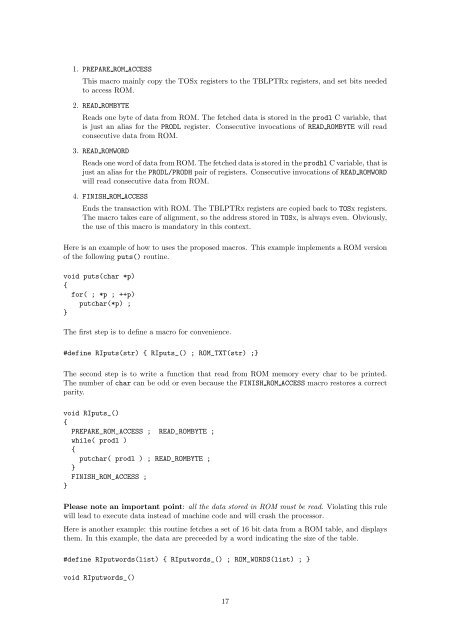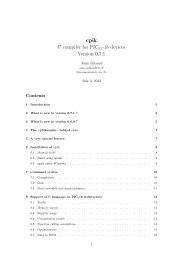cpik C compiler for PIC c -18 devices Version 0.6.0 - PiKdev, An IDE ...
cpik C compiler for PIC c -18 devices Version 0.6.0 - PiKdev, An IDE ...
cpik C compiler for PIC c -18 devices Version 0.6.0 - PiKdev, An IDE ...
Create successful ePaper yourself
Turn your PDF publications into a flip-book with our unique Google optimized e-Paper software.
1. PREPARE ROM ACCESS<br />
This macro mainly copy the TOSx registers to the TBLPTRx registers, and set bits needed<br />
to access ROM.<br />
2. READ ROMBYTE<br />
Reads one byte of data from ROM. The fetched data is stored in the prodl C variable, that<br />
is just an alias <strong>for</strong> the PRODL register. Consecutive invocations of READ ROMBYTE will read<br />
consecutive data from ROM.<br />
3. READ ROMWORD<br />
Reads one word of data from ROM. The fetched data is stored in the prodhl C variable, that is<br />
just an alias <strong>for</strong> the PRODL/PRODH pair of registers. Consecutive invocations of READ ROMWORD<br />
will read consecutive data from ROM.<br />
4. FINISH ROM ACCESS<br />
Ends the transaction with ROM. The TBLPTRx registers are copied back to TOSx registers.<br />
The macro takes care of alignment, so the address stored in TOSx, is always even. Obviously,<br />
the use of this macro is mandatory in this context.<br />
Here is an example of how to uses the proposed macros. This example implements a ROM version<br />
of the following puts() routine.<br />
void puts(char *p)<br />
{<br />
<strong>for</strong>( ; *p ; ++p)<br />
putchar(*p) ;<br />
}<br />
The first step is to define a macro <strong>for</strong> convenience.<br />
#define RIputs(str) { RIputs_() ; ROM_TXT(str) ;}<br />
The second step is to write a function that read from ROM memory every char to be printed.<br />
The number of char can be odd or even because the FINISH ROM ACCESS macro restores a correct<br />
parity.<br />
void RIputs_()<br />
{<br />
PREPARE_ROM_ACCESS ; READ_ROMBYTE ;<br />
while( prodl )<br />
{<br />
putchar( prodl ) ; READ_ROMBYTE ;<br />
}<br />
FINISH_ROM_ACCESS ;<br />
}<br />
Please note an important point: all the data stored in ROM must be read. Violating this rule<br />
will lead to execute data instead of machine code and will crash the processor.<br />
Here is another example: this routine fetches a set of 16 bit data from a ROM table, and displays<br />
them. In this example, the data are preceeded by a word indicating the size of the table.<br />
#define RIputwords(list) { RIputwords_() ; ROM_WORDS(list) ; }<br />
void RIputwords_()<br />
17



